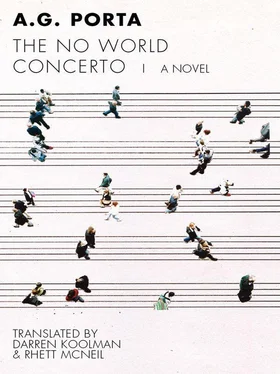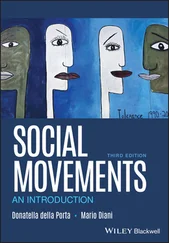The screenwriter smiles. If he wasn’t so desperate, he might even feel happy. Happy, because every step the girl takes has been fastidiously measured. She’s not going anywhere, he snickers. He won’t let her get away that easily. That would be running away, and he can’t have the girl in his story running off on him, however jaded she might feel, however disgusted she is by what the universe is thinking into existence around her. Back in the real world, the screenwriter would also like an escape route from his own life, and although writing provides this temporarily, his problems always return once he gets up from the typewriter. He’s not going anywhere either. He’s tired, and his situation seems utterly hopeless. His circumstances won’t allow him to get away that easily. He didn’t at all like the conversation he had with the bank employee. But he doesn’t want to think about that right now. Perhaps he’ll end up going crazy and blaming himself. Desperate, hopeless, he thinks while looking at the building across the street, at the real estate agency on the corner, the bakery, the shop selling women’s lingerie, and the shoe and handbag store that’s closed for the August vacation. The woman in the apartment opposite looks at him for a fraction of a second. The screenwriter somehow sensed it, and looking up, lifts his arm in greeting. But the woman’s already disappeared. It’s a possibility, he thinks. He fixes himself up in front of the bathroom mirror and puts on his navy blue jacket, the only jacket he has left. He takes a step backward. Not bad, he says, running his fingers through his hair. . he feels encouraged on remembering that not many people his age have a full head of hair. Gray hair suits him, and it gives him a certain gravitas. Women love running their hands through it. He crosses the street and ascends to the floor on which the woman lives. He hardly notices his limp. He rings the doorbell to one of the rooms and waits. Silence. He rings again, more insistently this time. No one. Perhaps she went out while he was in front of the mirror. He mentally maps the layout of the hallway, in case he’s picked the wrong room. He doesn’t think he has, but he’ll try the apartment next door. This time he definitely hears the sound of footsteps coming from inside, and in an instant, the door opens to reveal the woman he’s so often gaped and wondered at from his window across the street. She’s even more beautiful up close. The screenwriter introduces himself. At first she doesn’t seem to understand, but her puzzled expression soon changes to a look of recognition. After all this time, he says to her, it seems rude not to come over and say hello. And since he saw that she was in, he thought he’d take the opportunity to make her acquaintance. She holds the door firmly without loosening her grip. It’s not possible to live in a hotel and not be curious about one’s neighbors, he says, lifting his arm and pointing in the general direction of his room. He was thinking about inviting her to dinner, he says, trying to gain some more time. If she’d be kind enough to accept. . Perhaps, he says, he surprised her with his visit. He then explains that he’s alone in the city, and that he’d like to make a new friend, if she doesn’t have any prior commitments, that is. . the words spill one after the other from his lips, falling into his own ears as well, one after the other, sounding as awkward to him as he presumes they do to her, and he imagines that he wouldn’t respond to them either. Finally, she opts for shutting the door without speaking a word. The screenwriter rings the doorbell again, but the woman doesn’t answer, so he turns to make his way toward the elevator. Halfway there, though, he changes his mind, goes back, and starts thumping the door violently. You don’t know what you’re missing! he shouts. He strikes his cane against the floor, against the door, screaming, Bitch, you’re nothing but a bitch! At the end of the hallway, a door creaks slightly open and a woman’s face peeks out. Eventually, some other doors open, and some more people emerge, watching him in silence. What are you all looking at!? he demands of his audience. No one knocked on your doors and asked for your opinion! he says, raising his voice, and continuing his drumming on the woman’s door. What’s happening here is between me and this bitch, he says lifting his cane, so go back inside and mind your own business.
Back in his room, the screenwriter’s still reeling with anger; there isn’t a chance he’ll write anything now, at least not until he calms himself down. He leans against the window ledge and stares at the closed blinds of her apartment window. The woman pulled them down and turned her light off, but the screenwriter can feel her eyes peeping out at him, so he keeps staring back at her, angrily, intently. Dread, fear, terror. . he repeats to himself, his arms shaking as he holds the ledge without loosening his grip, until his rage eventually abates, and he no longer feels her eyes staring back at him. Then he goes to the telephone and calls his son. His daughter-in-law answers and they chat for a few moments. She seems a little cold, but at least she’s talking to him. He’s calling from the neighboring country’s capital, he says. The weather’s fine, although it’s rained on a couple of occasions. It’s sweltering over here, she says. They didn’t go anywhere during the August vacation because his son’s been out of work for some months now, and there don’t seem to be any prospects on the horizon. The screenwriter knows where this is going, without her having to say it: so don’t bother asking for any money. She puts his son on the phone. Immediately the screenwriter explains that the bank has frozen his account, and that he’s in desperate need of money because he can’t resolve the problem with them over the telephone. He says he’ll pay his son back as soon as the producer of the film gets back from his vacation. A money order to his hotel would be the most convenient way. Before hanging up, the son inquires after his mother. Your mother didn’t come with me, the screenwriter says. I’m afraid we decided to separate.
It’s early, and it promises to be a beautiful day. The screenwriter sits at his desk eager to continue working, but is distracted by his mental calculations. He figures the money his son’s sending will last him till the end of the month, but he may be able to get his screenplay finished before then, and once that’s delivered, he could ask the producer to send him more money. He needs money orders at this point; transfers into his current account will take too long to clear. In the building opposite, his neighbor’s blinds are still down. So what, it’s less distracting, he thinks, returning to his work. He goes over some of the index cards and post-its strewn about the room — on his desk, his nightstand, and the other bed, on which the newspapers have been gradually piling up. It’s been days since he heard from the girl. He hasn’t received a single envelope, not even a paltry note. He wonders if something might have happened to her, but then he also considers the possibility that she’s abandoned him, as she promised she would. Threats and promises are only wisps of breath, not realities, he says trying to allay his fears. Besides, she promised she’d keep sending him abstracts of her diary and chapters of her No World . Before, if she missed an appointment, she’d always dispatch a messenger with an envelope. Now, there’s nothing but silence: an emptiness to which he fears he may have to grow accustomed. He misses those pages that let him know she was still alive, that reminded him he was still alive. That made him feel he somehow mattered to her. The truth is he needs the girl as much as he needs money, or even food. Isn’t she the reason he came to the neighboring country’s capital in the first place? It’s a beautiful day outside. He looks at the sky, as if to prove himself right, then he looks down on street to observe the passersby. Sundays are strange. He’d like to go for a walk, to have breakfast at the café in the plaza, and buy his newspapers where the boulevards intersect. He wonders when his son’s money will arrive, and that of the other people who agreed to give him a loan. Now that he thinks of it, he doesn’t remember telling them how urgently he needs it. He goes to the phone and calls his son, but this time no one answers. So he returns to his desk, intent on getting some writing done before going down for breakfast. Once he’s finished his script and cashed his check, he’ll be able breathe a lot easier, he thinks. He counts the number of days it should take to complete, and reproves himself for not having written more consistently, and with greater resolution. Perhaps it’s not his lack of consistency but his approach that’s the problem. He might’ve written more had he been writing for himself instead of the producer. He has to rewrite some of the material he’s sending and improve the general shape of the story. He figures he has some five or six scenes left to write until the end. During his descent, the screenwriter’s impatient to leave the elevator and get something to eat. It’s been too long since he’s had two square meals together in one day. If he has breakfast now, it’ll probably be his only decent repast, which is why he’s tucking some fruit and bread into his pockets, on exiting the elevator, before sitting down to read the newspaper. He leafs randomly through the pages as if trying to decide what to read. Then the receptionist approaches: the manager would like to speak with him. He titters, reluctantly gets up, and drags his leg into an office that’s as small and uncomfortable as a coffin, and completely unsuitable for accommodating two people at once, but perhaps it’s the best a flophouse manager can expect. The man would like to speak in private. About what? the screenwriter says brusquely, thinking attack is the best form of defense. There’s been a complaint from one of the neighbors, he says sternly, before requesting that he pay his outstanding bill. He has twenty-four hours to find another room, he adds before ending the short colloquy in a manner to suggest that the meeting has ended. Although he’s been paying off some of the bill in advance, the final figure is still far too high for the screenwriter to pay. First he requests that they lower the bill for having offended him. Then he demands to check over the invoice, since he believes they’re overcharging him. For a moment, he wonders who he means by “they,” since he’s talking about an individual with a first and last name, and although the individual he’s referring to is sitting directly across from him, he can’t restrain himself from referring to another by screaming, that fucking bitch! Bitch or no bitch, the manager warns, you’ve got twenty-four hours to find somewhere else to stay.
Читать дальше












